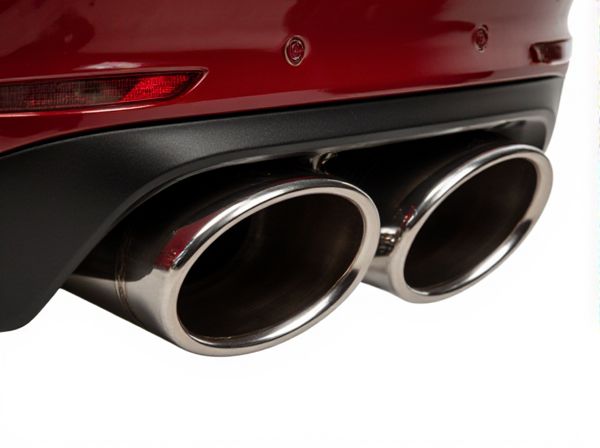
Photo illustration: Titanium Exhaust vs Stainless Steel Exhaust
A titanium exhaust offers superior strength-to-weight ratio and excellent corrosion resistance, making it ideal for performance-focused vehicles where reducing weight is crucial. Stainless steel exhausts provide durability, affordability, and ease of maintenance, often lasting longer under harsh driving conditions. Choosing between the two depends on your priority for lightweight performance or cost-effective longevity.
Table of Comparison
| Feature | Titanium Exhaust | Stainless Steel Exhaust |
|---|---|---|
| Weight | Lightweight, reduces overall vehicle weight | Heavier than titanium, adds weight |
| Durability | High strength, excellent corrosion resistance | Strong and corrosion-resistant but prone to rust over time |
| Heat Resistance | Excellent heat tolerance, withstands extreme temps | Good heat resistance, but lower than titanium |
| Cost | Premium price due to material and manufacturing | More affordable and widely available |
| Sound Quality | Sharper, more aggressive exhaust note | Deeper, more muffled sound |
| Longevity | Long-lasting with minimal maintenance | Durable but may require upkeep to prevent corrosion |
Introduction: Comparing Titanium and Stainless Steel Exhausts
Titanium exhaust systems offer superior strength-to-weight ratios and excellent corrosion resistance, making them ideal for performance and racing applications. Stainless steel exhausts provide durability and affordability, with good resistance to rust and heat, suitable for a wide range of vehicles. Choosing between titanium and stainless steel depends on performance goals, budget, and longevity requirements.
Material Properties: Titanium vs Stainless Steel
Titanium exhaust systems offer superior strength-to-weight ratio compared to stainless steel, providing enhanced durability while significantly reducing overall vehicle weight. Titanium exhibits excellent corrosion resistance and higher heat tolerance, maintaining structural integrity at temperatures exceeding 1,200degC, whereas stainless steel typically withstands up to 870degC. The lower density of titanium (4.5 g/cm3) compared to stainless steel (7.9 g/cm3) translates into better performance benefits, making titanium a preferred material in high-performance exhaust applications.
Weight Differences and Performance Impact
Titanium exhaust systems weigh approximately 40-50% less than stainless steel, significantly reducing overall vehicle weight and improving acceleration and handling. The lower density of titanium also enhances heat dissipation, contributing to better exhaust flow and increased engine performance. Despite higher costs, titanium exhausts offer superior durability under extreme temperatures, making them ideal for high-performance applications.
Durability and Corrosion Resistance
Titanium exhaust systems offer superior durability due to their high strength-to-weight ratio and exceptional resistance to thermal fatigue, making them ideal for high-performance and racing applications. Stainless steel exhausts provide excellent corrosion resistance, especially grades like 304 and 316, ensuring long-lasting performance in various environmental conditions. While titanium excels in lightweight durability, stainless steel is generally more cost-effective and better suited for everyday use where corrosion resistance is a primary concern.
Heat Tolerance and Thermal Conductivity
Titanium exhaust systems offer superior heat tolerance compared to stainless steel, with a melting point around 1,668degC (3,034degF) versus stainless steel's approximately 1,400-1,530degC (2,552-2,786degF), enabling better performance in high-temperature environments. Titanium's low thermal conductivity (~7 W/m*K) allows it to retain heat within the exhaust gases, improving scavenging and overall engine efficiency, whereas stainless steel, with higher conductivity (~16 W/m*K), dissipates heat more rapidly, which can reduce exhaust gas temperature. These properties make titanium exhausts ideal for high-performance applications where managing heat and maintaining exhaust gas velocity are critical for engine optimization.
Sound Characteristics and Acoustic Differences
Titanium exhaust systems produce a sharper, higher-pitched sound due to their thinner walls and lower density, which enhances resonance and sound projection. Stainless steel exhausts generate a deeper, more robust tone thanks to their heavier mass and greater sound insulation properties. The acoustic differences influence driving experience, with titanium favored for performance motorcycles and sports cars, while stainless steel suits vehicles prioritizing a balanced, subdued exhaust note.
Installation and Compatibility
Titanium exhaust systems offer lightweight benefits and high corrosion resistance, making installation easier on performance vehicles with limited undercarriage space. Stainless steel exhausts provide broader compatibility with various vehicle models due to their durability and cost-effectiveness, often requiring standard mounting points and hardware. Both materials typically fit aftermarket setups, but titanium may demand specialized fittings or adjustments for optimal integration.
Maintenance Requirements and Longevity
Titanium exhaust systems offer superior corrosion resistance and maintain structural integrity under high temperatures, resulting in lower maintenance requirements compared to stainless steel exhausts. Stainless steel exhausts, while durable and cost-effective, are more prone to rust and may require regular inspections and occasional repairs to prevent deterioration. Titanium's lightweight nature and enhanced longevity make it ideal for performance vehicles seeking minimal upkeep and extended service life.
Cost Analysis: Upfront and Long-Term Value
Titanium exhaust systems typically have a higher upfront cost, ranging from 2 to 3 times more than stainless steel exhausts, due to the material's lightweight and corrosion-resistant properties. Stainless steel exhausts offer a more budget-friendly initial investment with sufficient durability and resistance to rust, making them a preferred choice for cost-conscious consumers. Long-term value favors titanium for performance vehicles seeking weight reduction and longevity, while stainless steel remains cost-effective for everyday use with moderate maintenance expenses.
Choosing the Right Exhaust for Your Vehicle
Choosing the right exhaust for your vehicle depends on factors such as weight, durability, heat resistance, and sound preference. Titanium exhausts offer superior strength-to-weight ratio and excellent corrosion resistance, making them ideal for performance vehicles where weight savings are crucial. Stainless steel exhausts provide greater affordability, durability against rust, and a deeper, more traditional exhaust note preferred for everyday driving and longevity.
 caratoz.com
caratoz.com